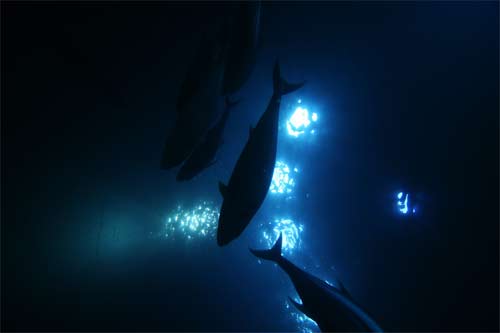Christmas: A Whale of a Time for All But the Animals
By Deva Gaura Hari Dasa | Дек 24, 2007

Yesterday the Japanese government bowed to international pressure and dumped its plan to kill the humpback whales on its yearly whale hunt. The Japanese whaling fleet still plans to cull more than 1000 other whales, mostly from the smaller minke species.
Much of the diplomatic pressure came from the Australian government, which plans to send customs vessels and navy planes to monitor the whaling fleet’s activities in the Southern Ocean, and collect video evidence which could be used in any future court case.
Japan’s chief government spokesman Nobutaka Machimura pointed out the cultural differences between Japan and countries like Australia over whaling, and seemed nonplussed by Australians’ affection towards the whales.
“Australians consider whales to be very affectionate, something I can’t really relate to,” he said. “But apparently they give names to every whale and there’s quite strong public sentiment.”
Japan says that unlike most other countries, eating whale meat is an important part of its culture. But whales are not the only point of difference between world cultures over what is considered an animal worthy of affection and protection, and one that is simply a source of food, able to be hunted or farmed and killed at will. There are numerous examples of cultural differences which allow slaughter of one species, while another is venerated.
Take the humble dog, which is given an affectionate name and often treated as part of the family in the Western world, while in parts of the East they are just another menu item; or the cow which is venerated and protected in India, but slaughtered by the millions in the West.
While it is certainly good news that Japan will spare the lives of 50 humpback whales this summer, it is ironic that on the eve of Christmas, such a huge diplomatic effort is aimed at saving 50 whales, while millions of other animals are slaughtered. The same governments that lobbied Japan stand strangely mute and indifferent to this slaughter, praising this flesh fest as a wonderful celebration of peace and goodwill.
According to the law codes of Vedic culture, the government must protect all citizens, including the animals, and every animal, no matter what species, should be allowed to live out its life peacefully, working through its own particular karma as ordained by providence. The only exception is a dangerous animal that poses a direct threat to humans.
The Vedas teach us that all life is sacred and that there are serious reactions for taking the life of any animal. These ancient teachings extol the follower to develop eyes of equality, by seeing the essence of life in all creatures. The result of this will be that one perceives the inherent sanctity in all life, and will protect all creatures from harm, not only those that our particular culture cherishes; whether it be the whale, pig, dog, cow or any other creature.
The devotees of the Krishna consciousness movement practice a strictly vegetarian diet, which avoids unnecessary suffering to all. On the anniversary of the appearance of a great saint or incarnation of God, the devotees will prepare a delicious variety of pure vegetarian foods, sanctify them by offering them to God, and then distribute the Прасадам (literally ‘mercy’ in the form of sanctified vegetarian food) to all in attendance. Such a feast is truly a feast of peace and goodwill, because no violence is involved in preparing such a feast, and everything is cooked in a spirit of service to God and all His creation.














